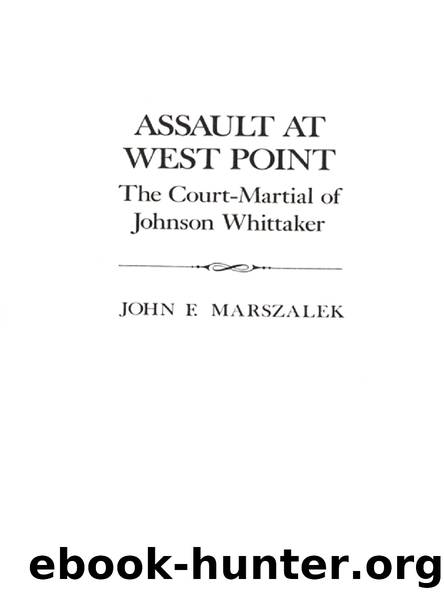Assault at West Point by John F. Marszalek

Author:John F. Marszalek
Language: eng
Format: epub
Publisher: Simon & Schuster Childrenߡs Publishing
Published: 1984-07-15T00:00:00+00:00
From its questioning and its attitude the prosecution put a great deal of reliance on Alexander’s testimony. He was after all a doctor, a member of the Army Medical Corps for twenty-four years and a respected member of the West Point faculty. His professional opinion condemning Whittaker carried much weight. He was a formidable witness. In response the defense tried to undercut some of Alexander’s eminence. Chamberlain began his cross-examination by showing that although Alexander had long served in the Army medical service, his experience was limited and his opinion thus open to question. The court learned that, during the Civil War, Dr. Alexander had spent no time in the field; he had been mainly an inspector of prisons and purchaser of medical supplies. The unspoken point was that, considering his lack of experience with wounds and unconsciousness, Alexander was not that much of an expert. Furthermore, his examination of Whittaker the morning after the attack had been cursory at best; he was basing his opinions on insufficient data.
Much of Chamberlain’s examination dealt with the question of Whittaker’s consciousness. Alexander insisted, at Chamberlain’s prompting, that Whittaker had passed out at the wrong time. He should have “fainted” during the actual ordeal, not afterward. Alexander said he knew of no case where a swoon like Whittaker’s had ever happened. Chamberlain replied that he knew from personal experience that Alexander was wrong. He had once been on a runaway horse and had collapsed only after the “horse had been reined up and the danger was gone.” One of the members of the court-martial board, Colonel Morrow, later tried to make a similar point. He asked Alexander if a “timid” person having been awakened in the dead of night, tied, injured, and threatened with death would not have possibly passed out as Whittaker had? After all, said Morrow, Whittaker had been accused of something stronger than timidity. Alexander insisted that, if a person could withstand all Whittaker had without fainting, there was no reason to believe he would faint afterward.
Alexander was on the stand the greater part of two days, February 14 and 16, doggedly defending the correctness of his initial opinion. The defense could not shake his belief in Whittaker’s guilt, and he was a strong witness for the prosecution. 12
The next witness was Lieutenant Colonel Henry M. Lazelle, the Commandant of Cadets and the author of the original damning investigation report used against Whittaker. Lazelle, like Alexander, stuck to his story. However, he did not present his opinions nearly as strongly as he had in his report. During his testimony and cross-examination he admitted having had doubts about Whittaker’s guilt, until the evening after the attack. At that time he had noticed the ridges in Whittaker’s hair, and these had convinced him Whittaker had cut his own hair and consequently mutilated himself. Dr. Alexander’s medical judgment and the absence of any significant injury added further weight in his conviction. Chamberlain and Greener tried to get Lamelle to change or at least modify his story, but they were unsuccessful for the most part.
Download
This site does not store any files on its server. We only index and link to content provided by other sites. Please contact the content providers to delete copyright contents if any and email us, we'll remove relevant links or contents immediately.
| Africa | Americas |
| Arctic & Antarctica | Asia |
| Australia & Oceania | Europe |
| Middle East | Russia |
| United States | World |
| Ancient Civilizations | Military |
| Historical Study & Educational Resources |
The Radium Girls by Kate Moore(12029)
100 Deadly Skills by Clint Emerson(4926)
Rise and Kill First by Ronen Bergman(4790)
The Templars by Dan Jones(4689)
The Doomsday Machine by Daniel Ellsberg(4490)
The Rape of Nanking by Iris Chang(4214)
Killing England by Bill O'Reilly(4004)
Stalin by Stephen Kotkin(3969)
Hitler in Los Angeles by Steven J. Ross(3946)
12 Strong by Doug Stanton(3550)
Hitler's Monsters by Eric Kurlander(3343)
Blood and Sand by Alex Von Tunzelmann(3205)
The Code Book by Simon Singh(3189)
Darkest Hour by Anthony McCarten(3133)
The Art of War Visualized by Jessica Hagy(3009)
Hitler's Flying Saucers: A Guide to German Flying Discs of the Second World War by Stevens Henry(2754)
Babylon's Ark by Lawrence Anthony(2680)
The Second World Wars by Victor Davis Hanson(2526)
Tobruk by Peter Fitzsimons(2518)
